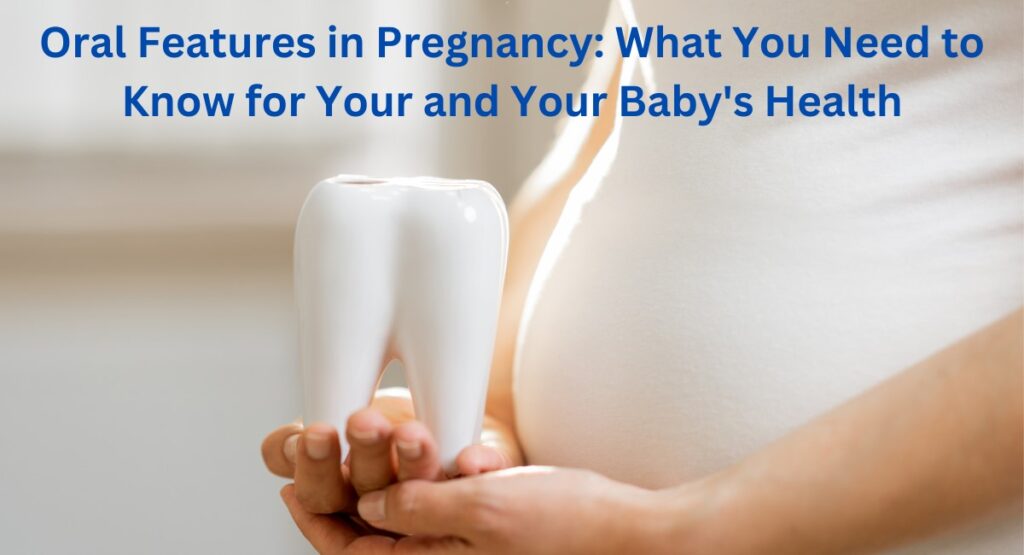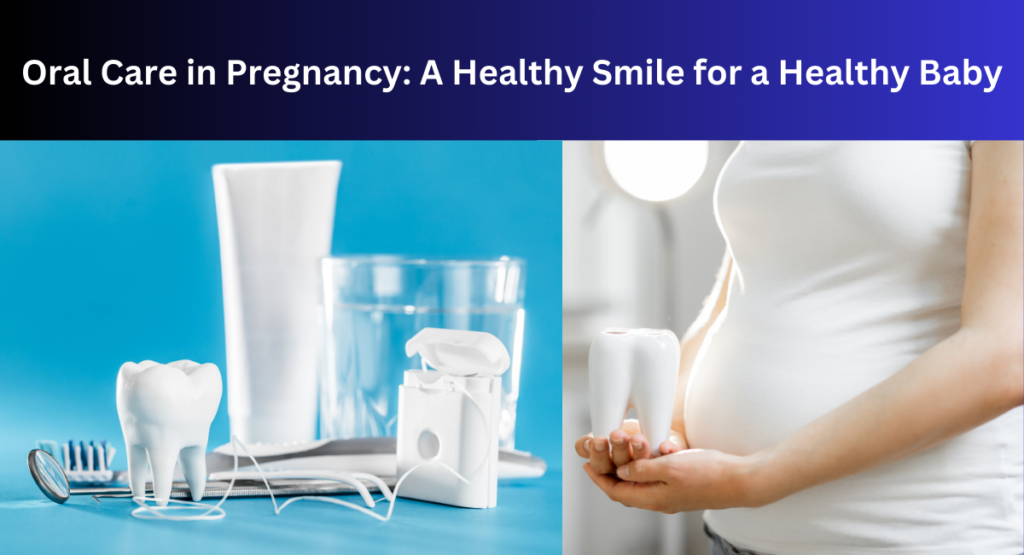
Oral Care in Pregnancy
The journey of pregnancy is a transformative and miraculous time for women. It demands heightened care and attention, particularly in maintaining oral health, especially oral care in pregnancy. The connection between a woman’s oral well-being and her baby’s health is profound. Here’s a comprehensive guide covering oral health care before, during, and after pregnancy, ensuring a healthy journey through these crucial stages of life.
Risks Associated with Poor Oral Health in Pregnancy
Poor oral health during pregnancy poses risks for both the mother and the developing baby. Gum disease, in particular, has been associated with miscarriage, premature birth and low birth weight. Bacteria from gum disease can potentially affect the developing baby.
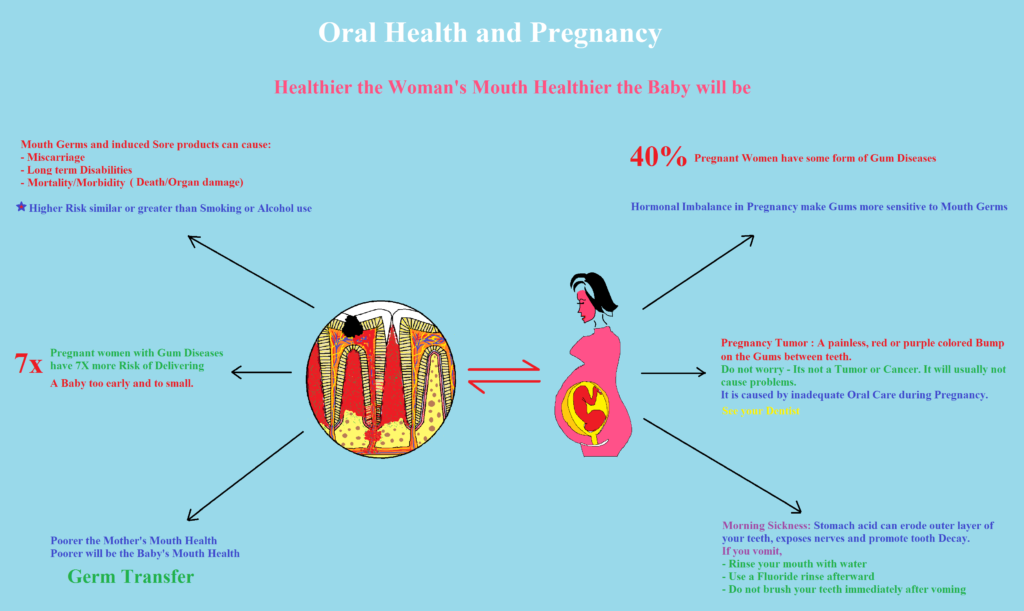
Risks Associated with Poor Oral Health in Pregnancy
What are the Oral changes during Pregnancy?
During pregnancy, notable hormonal and metabolic changes affect both oral and overall health. These shifts result in increased blood flow to the gums, rendering them more susceptible to infection and inflammation. These changes in the mouth also exacerbate existing oral infections. The following oral changes take place during pregnancy.
- Pregnancy Gingivitis
- Pregnancy Epulis
- Tooth Decay
- Teeth Erosion
- Saliva Changes
- Increased Saliva Production
- Dry Mouth
- Changes in Taste Sensation (Dysgeusia)
- Increased Pigmentation in Gums
Explore the comprehensive details of oral changes during pregnancy, including their causes, symptoms, prevention, and treatment, in our article titled ‘Oral Features in Pregnancy: What You Need to Know for Your and Your Baby’s Health’.
Oral Care in Pregnancy
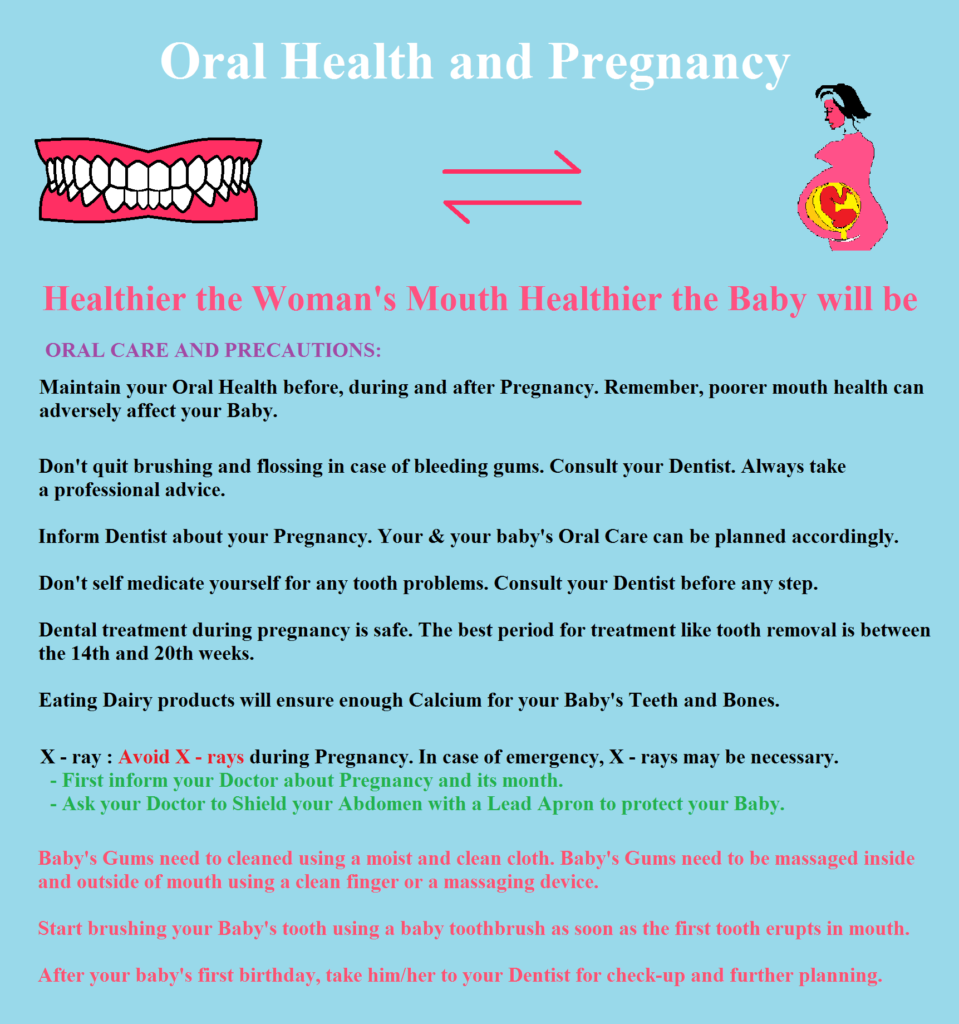
Oral care in pregnancy
Oral Care Before Pregnancy
Preparing for Oral Health
Optimal oral health before pregnancy is beneficial. It’s essential to address any existing dental issues, undergo dental check-ups, and adopt good oral hygiene practices before conceiving. Pre-pregnancy dental care lays the foundation for a healthy journey.
Oral Care During Pregnancy
Inform your Dentist:
During pregnancy, ensure you inform your dentist about your pregnancy and the specific trimester you are in. It’s crucial to share details about any medications, including supplements, that you might be taking.
Prioritize good oral hygiene:
Emphasize and strictly follow good oral hygiene practices, especially as elective dental procedures are generally avoided during pregnancy.
- Carefully brush teeth at least three times a day using fluoride toothpaste and a small headed, soft-bristled brush to strengthen enamel and prevent cavities.
- Using fluoride toothpaste during pregnancy is generally considered safe and beneficial for maintaining oral health. However, it’s advisable to consult your dentist or healthcare provider to ensure it aligns with your specific health needs and trimester of pregnancy. Consulting a professional can offer personalized guidance on oral care products suitable for your situation.
- Remember to floss and use oral irrigation once daily. Follow the correct tooth-brushing and inter-dental cleaning methods.
- Anti-bacterial mouthwash should only be used briefly, particularly in specific situations, such as when a pregnant woman finds it challenging to perform physical cleaning effectively or during acute infections. Alcohol-free mouthwashes are considered safe and effective. Emphasize physical cleaning measures over chemical solutions for maintaining oral hygiene.
Embrace a healthy and balanced diet:
Eating nutritious food is crucial for both your dental and overall health, benefiting both you and your baby. The development of your baby’s first teeth begins around the third month of pregnancy. Check our article on diet for details about maintaining a healthy and balanced diet. Ensure your diet includes proteins and minerals that are essential for the development of your baby’s teeth, bones, and oral health.
It’s crucial to strictly refrain from adverse habits such as tobacco, smoking, cannabis (drugs), and alcohol during pregnancy, as they can harm both you and your baby. Temporary pleasure from these habits can lead to permanent issues. Check our article on ‘how to quit tobacco’ for guidance on stopping these habits immediately.
Avoid exposure to harmful substances:
Whether through work-related or non-work-related circumstances, avoid contact with chemicals, pesticides, household cleaners, viruses, X-rays, and radiation during pregnancy. These exposures should be strictly avoided to safeguard both your and your baby’s health. For health-related exposures like medications and X-rays, it’s crucial to consult a healthcare professional. They will make decisions based on weighing the risks against the benefits before proceeding.
To protect your teeth from the effects of stomach acid after morning sickness, consider swishing with a mixture of water and baking soda. Avoid brushing your teeth immediately after vomiting; instead, drink water and wait for at least 30 minutes before brushing to prevent enamel damage. Additionally, consult your dentist for a professional fluoride application, which can help minimize erosion caused by stomach acid.
Preventing Morning Sickness
Consult your gynecologist to seek advice on preventing or minimizing morning sickness. While completely preventing morning sickness is challenging, managing its symptoms can indirectly aid in reducing vomiting, thus helping to prevent teeth erosion. Here are some helpful tips to alleviate the frequency or severity of morning sickness:
- Eat smaller, more frequent meals to prevent an empty stomach.
- Avoid spicy, greasy, or strong-smelling foods that may trigger nausea.
- Stay well-hydrated by sipping water throughout the day.
- Consider trying ginger-based products or herbal teas known for their anti-nausea effects.
- Take breaks for fresh air or rest to reduce stress and triggers for nausea.
Best period for dental treatment:
Avoid dental procedures during the first and third trimester of pregnancy. The optimal time for dental treatment is during the second trimester, typically between 14 to 20 weeks, as this period aligns with the completion of fetal organ development. Routine dental care, such as dental fillings, root canal treatments, and simple extractions, is generally safe during this phase. Stressful procedures like impacted wisdom tooth removal, gum surgery, or extensive restorative treatments should be postponed until after delivery. Emergency dental treatments can be carried out at any time during pregnancy but consult both your dentist and gynecologist before undergoing any emergency dental procedure to ensure coordinated care and safety for you and your baby.
Avoid X-rays, particularly during the first trimester (0 to 14 weeks). In emergencies or when absolutely necessary, if an X-ray is required, ensure the use of a lead apron and other protective measures. Inform your dentist or radiologist about your pregnancy and the specific trimester (month) before any X-ray exposure. Your doctor will take all necessary precautions to safeguard you and your baby. Technological advancements like digital radiography have significantly enhanced the safety of X-rays, making them safer than, for instance, a flight from New York to Los Angeles. Read further about daily radiation exposure compared to dental X-ray in our article on “Dental X-ray Safety: Debunking Myths and Ensuring Your Well-Being.”
Anesthesia:
Local dental anesthesia is generally safe for regular dental care. However, avoid general anesthesia or sedation during the first trimester (0 to 14 weeks) of pregnancy. It’s advisable to consult with your gynecologist before proceeding with any dental treatment involving anesthesia.
Medication Safety During Pregnancy:
Avoid medication use, especially during the first trimester, unless the risk from an infection outweighs the potential risk from medications. Certain medications like chloramphenicol, ciprofloxacin, levofloxacin, sulfonamide, primaquine, tetracycline, codeine, aspirin, ibuprofen, warfarin, clonazepam, lorazepam, and more should be avoided during pregnancy. It’s crucial to note that information about medication safety during pregnancy can evolve with new research. Therefore, always seek advice from your gynecologist and dentist before considering any medications.
Positioning during Dental Treatment for Pregnant Women:
The recommended position for a pregnant woman in the dental chair is the left lateral position with the right buttock and hip slightly elevated. Your dentist may provide a small pillow under the right hip to enhance comfort. It’s generally advised for pregnant women to remain in this position during treatment. The flat supine position may exert pressure on the blood vessels, impacting blood circulation to both you and your baby. This pressure can lead to issues like fainting (hypotension) or reduced oxygen supply (hypoxia). These precautions are taken to ensure the optimal health and safety of both you and your baby during dental care.
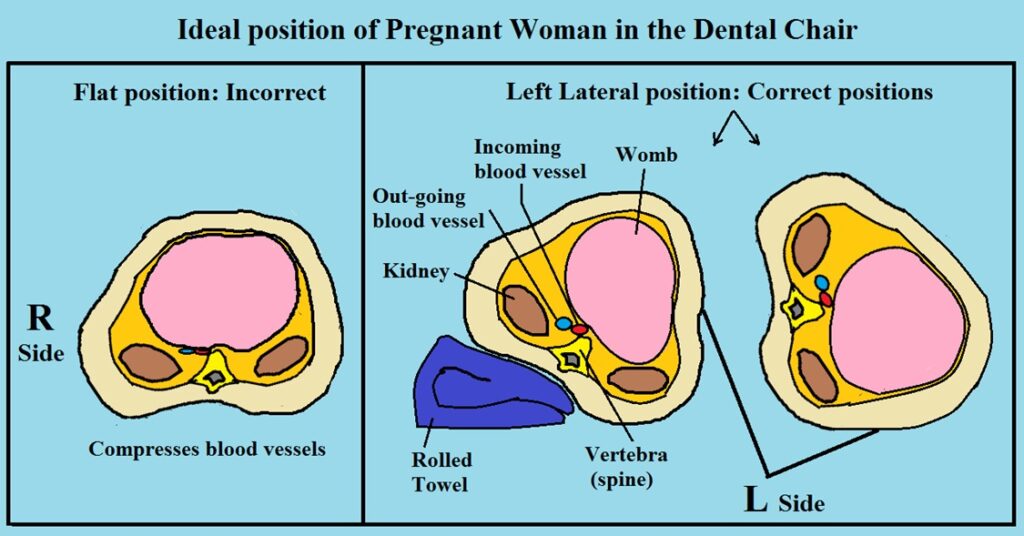
Ideal resting position for pregnant women.
Routine Check-ups for Oral Health and Pregnancy:
It is highly advisable to maintain regular visits to both your gynecologist and dentist throughout your pregnancy. Skipping these appointments should be avoided. Regular check-ups with your gynecologist ensure the overall health and well-being of you and your baby, while dental check-ups ensure the maintenance of your oral health during this crucial period. Both gynecological and dental check-ups play vital roles in ensuring a healthy pregnancy journey.
Post-Delivery Oral Care
After delivery, dental treatments are generally safe and permissible during breastfeeding. However, it’s vital to inform your healthcare provider about your delivery to ensure safe dental care.
- Maintaining oral health becomes crucial as the body adjusts after pregnancy. This phase not only involves revitalizing personal oral care practices but also introduces considerations for the baby’s oral health. Adapting to the changes post-pregnancy, attention to both the mother’s and the baby’s oral care becomes an essential part of the new routine.
- Certain medications, such as aspirin, certain cancer medications, lithium, retinoids, etc., are contra-indicated during breastfeeding, as they might negatively impact the infant’s health. Most medications are generally safe during breastfeeding, but consultation with a healthcare provider is essential to avoid potential risks.
- It’s recommended to clean the baby’s gums after feeding to remove any residue. Gently massaging the baby’s gums and jaws can aid in oral hygiene. It also supports smoother tooth eruption, reducing teething problems and discomfort, while facilitating proper jaw growth and alignment of the teeth.
- Teething usually begins between 4 to 6 months of age. Exploring further details about oral care during teething in our ‘teething’ article can offer valuable guidance.
- Tooth decay, an infectious and transmissible disease caused by germ transfer, should be prevented. Avoid sharing utensils or cleaning bottle-nipples by placing them in your mouth to prevent the transfer of harmful bacteria.
- For the baby’s dental health, schedule the first dental check-up before their first birthday or within 6 months after the eruption of the first tooth. An article available on ‘teeth eruption: a parent’s guide’ can provide insights into the timetable for teeth eruption, aiding in understanding the expected milestones for your baby’s dental growth and development.
This comprehensive care ensures both the mother and baby maintain optimal oral health post-delivery.
Conclusion
In the journey from before pregnancy, through the delicate phase of pregnancy, and into the phase post-delivery, oral care remains an essential aspect that intertwines the well-being of both the mother and the baby. Prioritizing oral health before conception, maintaining vigilant care during pregnancy, and continuing diligent practices after childbirth form a continuum of well-being. As oral hygiene significantly impacts overall health, these stages demand consistent attention, guidance, and professional care. This holistic approach not only fosters a healthy smile but ensures a foundation for the lasting well-being of both the mother and the precious new arrival.
FAQs
Is it safe to have dental procedures during pregnancy?
Yes, it’s generally safe to have routine dental check-ups and cleanings during pregnancy. However, elective procedures should ideally be postponed until after the first trimester. Inform your dentist about your pregnancy and any medications you might be taking. Dental x-rays and certain medications are generally avoided during pregnancy, especially in the first trimester.
How often should I visit the dentist while pregnant?
It’s recommended to continue routine dental visits during pregnancy. The American Dental Association (ADA) suggests at least one dental visit during pregnancy for an examination and professional cleaning. Your dentist might recommend more frequent visits depending on your oral health needs.
Do pregnancy hormones affect oral health?
Hormonal changes during pregnancy can impact oral health. Increased progesterone levels can lead to higher susceptibility to gum disease, known as pregnancy gingivitis. This condition may cause gums to become red, swollen, and prone to bleeding. Good oral hygiene practices and regular dental check-ups can help manage these changes.
What are the best foods for maintaining oral health during pregnancy?
A balanced diet is crucial for good oral health during pregnancy. Foods rich in calcium (dairy products, leafy greens) and Vitamin C (fruits and vegetables) are beneficial. These nutrients support the development of the baby’s teeth and bones and maintain the mother’s oral health.
Are there natural remedies for addressing oral discomfort during pregnancy?
Rinsing with warm saltwater can help relieve discomfort caused by pregnancy gingivitis. It’s essential to maintain good oral hygiene practices, including regular brushing and flossing. Some pregnant women find relief by using a softer toothbrush or switching to a toothpaste for sensitive teeth.

